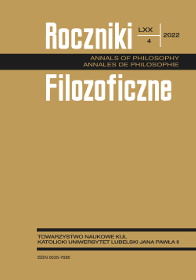Krytyka Alasdaira Macintyre’a koncepcji o tożsamości narracyjnej. Perspektywa neurofilozoficzna
Abstrakt
W myśl koncepcji MacIntyre’a warunkiem posiadania przez sprawcę spójnej tożsamości jest zdolność przedstawienia swojego życia jako opowieści, która łączy w całość różne epizody jego życia. Opowieść ta powinna wyjaśniać związki między tymi epizodami. Opiera się ona na pojęciu dobra istot ludzkich. Pojęcie dobra powinno być obecne w życiu sprawcy, aby nadać kierunek jej życiu. Ta integralność tworzy tożsamość sprawcy. Autorzy kwestionują tę narracyjną koncepcję tożsamości. Jak argumentują, chociaż tożsamość kształtuje się w obecności innych, nie musi tworzyć jednolitej formy narracyjnej, tzn. sprawca nie musi umieszczać wszystkich epizodów swojego życia w porządku narracyjnym ani posiadać spójnego i jednolitego ujęcia swojego życia od chwili narodzin aż do śmierci. Do kształtowania tożsamości wystarczą krótsze epizody formacji. Autorzy odwołują się do niektórych ustaleń psychologii empirycznej i neuronauki, aby uzasadnić swoje stanowisko.
Bibliografia
Allebone, J., G. Rayner, B. Siveges, S. J. Wilson. 2015. “Epilepsia Altered Self-Identity and Autobiographical Memory.” Epilepsy 56(12): 1982–91.
Berzonsky, M. D. 2011. “A Social-Cognitive Perspective on Identity Construct.” In Handbook of Identity Theory and Research, edited by S. J. Schwartz et al., 55–76. New York: Springer.
Casebeer, W. D., and P. S. Churchland. 2003. “The Neural Mechanisms of Moral Cognition: A Multiple-Aspect Approach to Moral Judgment and Decision-Making”. Biology and Philosophy 18(1): 169–194. https://doi.org/10.1023/A:1023380907603.
Cho, E. D. 2018. “Narrative Identity.” In Encyclopedia of Psychology and Religion, edited by David A. Leeming D. Berlin–Heidelberg: Springer. https://doi.org/10.1007/978-3-642-27771-9_200167-1.
Erikson, Erik H. 1958. Young Man Luther. New York: Norton.
Erikson, Erik H. 1968. Identity: Youth and Crisis. New York: Norton.
Faught, Edward. 2016. “Who Am I? Forgetting Your Past Is Forgetting Yourself.” Epilepsy Currents 16(3): 141–42. https://doi.org/10.5698/1535-7511-16.3.141.
Lane, Andrew. 2011. “The Narrative Self-Constitution View: Why Marya Schechtman Cannot Require it for Personhood.” Macalester Journal of Philosophy 20(1): Article 6. http://digitalcommons.macalester.edu/philo/vol20/iss1/6.
MacIntyre, Alasdair. 1959. “Notes from the Moral Wilderness, II.” The New Reasoner 8 (Spring): 89–98.
MacIntyre, Alasdair. 1966. A Short History of Ethics. London: Routledge, 1998.
MacIntyre, Alasdair. 1981. After Virtue: A Study in Moral Theory. 3rd ed. Indiana: University of Notre Dame Press.
MacIntyre, Alasdair. 1982. “Intelligibility, Goods, and Rules.” The Journal of Philosophy 79 (11): 663–65.
MacIntyre, Alasdair. 1986. “The Intelligibility of Action.” In Rationality, Relativism and the Human Sciences, edited by Richard M. Burian, Joseph Margolis, and Michael Kraus, 63–80. Dordrecht: Martinus Nijhoff Publishers
MacIntyre, Alasdair. 1987. “Can One Be Unintelligible to Oneself?” In Philosophy in Its Variety: Essays in Memory of François Bordet, edited by Christopher McKnight and Marcel Stchedroff, 23–37. Belfast: Queen’s University of Belfast.
MacIntyre, Alasdair. 2016. Ethics in the Conflicts of Modernity: An Essay on Desire, Practical Reasoning, and Narrative. Cambridge: Cambridge University Press.
McAdams, Dan P. 1985. Power, Intimacy, and the Life Story: Personological Inquiries into Identity. New York: Guilford Press.
McAdams, Dan P. 1995. “What Do We Know When We Know A Person?”. Journal of Personality 63(3): 365–95.
McAdams, Dan P. 2011. “Narrative Identity.” In Handbook of Identity Theory and Research, edited by Seth J. Schwartz, Koen Luyckx, and Vivian L. Vignoles, 99–115. London: Springer.
McCall, George J., and Jerry L. Simmons. 1978. Identities and Interactions: An Examination of Human Associations in Everyday Life. New York: Free Press.
McDowell, John. 1979. “Virtue and Reason.” Monist 63(3): 331–50.
Nelson, Hilde L. 2003. Damaged Identities, Narrative Repair. Ithaca, NY: Cornell University Press.
Raggatt, Peter T. F. 2006. “Multiplicity and Conflict in the Dialogical Self: A Life-Narrative Approach.” In Identity and Story: Creating Self in Narrative, edited by Dan P. McAdams, Ruthellen Josselson, and Amia Lieblich, 15–35. Washington, DC: American Psychological Association Press.
Ritivoi, Andreea D. 2011. “Virtuous Selves in Vicious Times: Alasdair MacIntyre on Narrative Identity.” Narrative Inquiry 21(2): 367–73.
Ricoeur, Paul. 1986. “Life: A Story in Search of a Narrator.” In Facts and Values: Philosophical Reflections from Western and non-Western Perspectives, edited by Marinus C. Doeser and John Kraay, 34–68. Dordrecht: Martinus Nijhoff.
Schechtman, M. 1996. The Constitution of Selves. Ithaca, NY: Cornell University Press.
Schneewind, J. 1982. Virtue, Narrative, and Community: MacIntyre and Morality. The Journal of Philosophy, 79(11): 653–63. https://doi.org/10.2307/2026540.
Serpe, Richard T., and Sheldon Stryker. 2010. “The Symbolic Interactionist Perspective and Identity Theory.” In Handbook of Identity Theory and Research, edited by Seth J. Schwartz et al. 225–48. New York: Springer.
Stanley, B. K., and Shaun Nichols. 2012. “Memory and the Sense of Personal Identity.” Mind 121(483): 677–702. https://doi.org/10.1093/mind/fzs080.
Schleim, S., and F. Schirman. 2011. “Philosophical Implications and Multidisciplinary Challenges of Moral Physiology.” Trames Journal of the Humanities and Social Sciences 15(2): 127–46. https://doi.org/10.3176/tr.2011.2.02.
Strawson, Galen. 2004. “Against Narrativity.” Ratio. An International Journal of Analytic Philosophy 17: 428–52.
Strohminger, Nina, and Shaun Nichols, 2015. “Neurodegeneration and Identity.” Psychological Science 26(9): 1469–79.
Taylor, Charles. 1992. Sources of the Self: The Making of the Modern Identity. Cambridge: Cambridge University Press.
Copyright (c) 2022 Roczniki Filozoficzne

Utwór dostępny jest na licencji Creative Commons Uznanie autorstwa – Użycie niekomercyjne – Bez utworów zależnych 4.0 Międzynarodowe.





